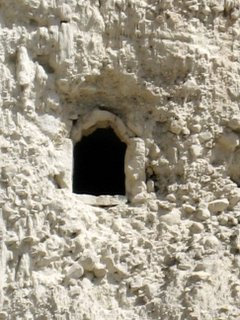It seems to me that Borchi Nofshi, Psalm 104, which is said on Rosh Chodesh mornings might just be the most overlooked section of our prayers. By the time we finish Hallel, leining and mussaf (if you are davening ashkenaz) you are probably already late for your train/bus/car pool and Borchi Nofshi often gets short shrift.
Add to that the fact that Nissan is probably the most hectic month of the year (in case you are wondering why, you better start your Pesach cleaning NOW!). Therefore, it just might be that the Borchi Nafshi we say tomorrow may not get the proper attention it deserves.

Borchi Nofshi praises the majesty of Hashem by detailing the splendor of His creation. The idea is that by contemplating the amazing beauty and detail of the world around us, we will come to a greater appreciation of Hashem’s wisdom and power. (Ironic that the very prayer that seeks to keep us from going through life without stopping to appreciate the beauty of the world around us is often said in the very hurried non-contemplative manner it seeks to avoid)

By taking a moment to stop and think about just one verse in Borchi Nafshi and make it just a bit more real, we may just say it a little slower with just a bit more concentration.
One of the most effective means by which to increase kavanah is by employing tzior-drawing a mental picture of the thing you are speaking about in order to augment focus.
Pasuk 18 states “Harim HaGevohim La’Yelim, selaim machseh La’shefanim”- The high mountains are for the Yaelim (ibex), the rocks are a refuge for the shefanim (hyrexs).

Ein gedi is the place that Dovid Hamelekh hid, in a cave, from Shaul Hamelekh. It is not a tremendous stretch that Dovid either wrote Barchi Nafshi here or at least had it in mind when he was writing it.
At Ein Gedi you can often see yaelim gracefully traversing the treacherous mountains and shefanim scurrying and hiding among the rocks. These pictures taken at Ein Gedi may help us create the mental picture necessary for tzior.
Once we are focused on Hashem’s infinite wisdom in creating the perfect place for each of His creations, we can take the next step of focusing on the fact that Hashem also created the perfect place for each and every one of us. Chodesh Tov. (Best wishes for a good month)


Yup. And I rarely have to daven at that one but had an early morning meeting downtown.
Quite right, David! I never have the luxury of an 8:00 minyan, but I had just picked my son up from the airport. I passed you as you were leaving the second minyan?!?
Great story, Gershon.
Ruby: I mentioned to Mark earlier that I had davened in a nusach sefard minyan which also made a difference in my Borchi Nafshi. I thought I saw you coming into CS (with your son?) for the third minyan.
Your post enhanced my davening today. (It also helped that I davened at a nusach Sefard minyan…) Thank you!
Just thought about it again – it’s probably over 60 years ago
That was a refershing post! Thanks!
————–
Someone just sent me an interesting quote from a book (don’t know which one), where Rav Lau (former chief Rabbi of Israel) offers us a wonderful glimpse into Rav Shlomo Zalman Auerbach zt”l’s fascination with Hashem’s world. This little story must have happened about 50 years ago.
————–
R. Yisrael Meir Lau writes about the following episode when he was about 17 or 18 (pp. 155-156):
A number of times, I accompanied the rabbi [R. Shlomo Zalman Auerbach] back to his home from yeshiva, after his lecture. Sometimes we walked in silence and sometimes we spoke. In one of the conversations, he told me that R. Fogelman, my uncle from Kiryat Motzkin, visited him. “He is a precious man. He loves you like a son and wants you to take the Bagrut [high school graduation] examinations to ease your future. In the best of his estimation, this will help you arrange your life. He knows that in our yeshiva we only learn Torah studies and not secular studies. However, I responded to his request based on your unique circumstances and in order to satisfy him. He is a great Torah scholar, and if this is his judgment, then at night — after the regular yeshiva sessions — you can study on your own for the Bagrut examinations. You have abilities — so go and study.”
A number of days after that, R. Shlomo Zalman asked what I thought about my studies. I answered him that I cannot approach [the material for] the Bagrut because I did not even study in ninth grade. I first have to take the earlier examinations in order to be prepared for the Bagrut examinations. The rabbi was interested in which subjects are tested, and I told him about physics and chemistry, biology and geography, and I explained to him that I am not good in the sciences and prefer the humanities. He opened his mouth in surprise and asked how it is possible not to love physics. Is this not the science that deals with the creation of the world, which is the greatness of the Creator and the greatness of the creation?
He continued and said excitedly: I take the bus, line 5, with students who are traveling to the university in Terra Sancta. If I have luck, they clear for me a space… I listen to them speaking on the way and exchanging idea in advance of a lecture or test. If I hear something about physics, electricity, water, climate, I listen carefully so that I might absorb something, any interesting new idea. Remember what it says in Isaiah, ch. 40: “Lift up your eyes on high and see who has created these things.” How is it possible that you do not love physics?